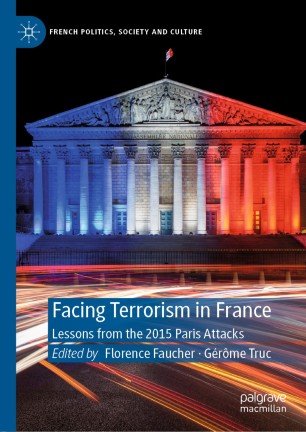
从2015年起,欧洲遭受了新一波恐怖袭击,这些袭击由国际伊斯兰主义组织(ISIS)协调或支持,但有时也由目标国家的公民实施:对巴黎、布鲁塞尔、伦敦、曼彻斯特、尼斯和巴塞罗那的袭击可能最受关注,但最具戏剧性的袭击发生在2015年1月和11月的巴黎。这些事件动摇了法国社会的基础,不仅因为它们的规模,还因为目标的象征性质。1月份,这些目标被精心挑选为法国(讽刺周刊《查理周刊》、警察部队、犹太社区)和欧洲自由主义价值观(记者和漫画家)的象征,11月份,受害者是享受音乐、体育和餐馆的普通人。这本书对法国社会的复杂反应进行了独特的跨学科调查:从个人层面(巴塔克兰袭击的幸存者、向受害者致敬的情绪化公民、法国穆斯林),到公民协会和网络社区的中观层面,以及国家和公众舆论的宏观层面。
Facing Terrorism in France: Lessons from the 2015 Paris Attacks
From 2015, Europe was hit by a new wave of terrorist attacks, coordinated or supported by an international Islamist organization (ISIS) but sometimes also perpetrated by citizens of the targeted country: the attacks on Paris, Brussels, London, Manchester, Nice and Barcelona probably attracted most attention but the most dramatic were perpetrated in Paris, in January and November 2015. These events shook the foundations of French society not only because of their magnitude but also because of the symbolic nature of the targets. Whilst in January, the targets were carefully selected as emblematic of France (the satirical weekly Charlie Hebdo, the police forces, the Jewish community) and of European liberal values (journalists and cartoonists), in November the victims ordinary people enjoying music, sports and restaurants. The book offers a unique interdisciplinary investigation into the complex responses of French society: from the individual level (survivors of the Bataclan attack, emotional citizens paying homage to the victims, French Muslims) to the meso level of civic association and web communities, and the macro level of the State and public opinion.
OR



![传播仇恨:白人至上主义恐怖主义的全球崛起[有声读物]](https://www.yousuxue.com/wp-content/themes/riplus/timthumb.php?src=https://sanet.pics/storage-8/0422/9IYtB6Cg4ugO3lpYJb0DqBwmwaYKKI0r.jpg&h=200&w=300&zc=1&a=c&q=100&s=1)
![未来和平:技术、侵略和战争的冲动[有声读物]](https://www.yousuxue.com/wp-content/themes/riplus/timthumb.php?src=https://sanet.pics/storage-8/0422/nrEGEGAogddbzxF8S0ghv2nV7vpdd0dV.jpg&h=200&w=300&zc=1&a=c&q=100&s=1)